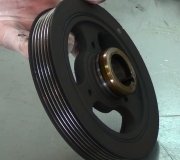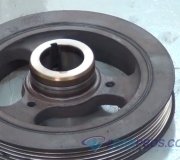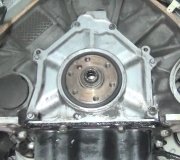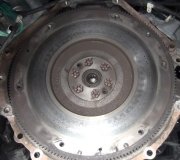I haven't heard of this problem specifically on this engine, but if the dealer told you it was end play of the crank, I can share some history that might be relevant.
Ford had a problem with their police engines in 1972. All of their crankshafts had to be replaced. I only knew about that one because I lived half a block from the Police station and the guys parked in front of my house. When they went home I heard them talking about the problem. Don't know what the symptom was.
In 1989, the first year for Chrysler's very nice 3.3L, they developed a severe oil leak from the rear main seal. It was caused by the crankshaft walking backwards and pushing the seal out. Almost without exception that occurred within the first 15,000 miles and was always handled under warranty. The cause was the crankshaft wasn't hardened properly to prevent wear. The thrust bearing, which controls end play, was not the problem. That would have been an easy fix. Instead, at 8:00 in the morning, the engine mechanic drove the van into the wash bay to clean the engine, drove it out of the shop and into his bay on the other side of the building, pulled the engine up through the top, mounted it on an engine stand, wheeled it back to the wash bay for another cleaning, got helpers to push the van outside and back to the wash bay for a second cleaning, pushed it back to his stall, then stopped for a cigarette. (I think that cigarette was to give me the chance to start a new sentence)! Next, he flipped the engine over, removed the oil pan, oil pump, and crankshaft, walked over to the parts department to pick up his new crankshaft. I think he got new bearings too but I'm not sure. Installed the new crank, bolted everything together, wheeled it around the corner to wash it AGAIN, wheeled it back and hoisted it up over the engine compartment, then stopped for lunch at noon! Came back from lunch at 1:00 and had the engine installed and running by 2:00 p.M. The guy was amazing but he didn't accomplish that with the first few he did. It was through the experience of doing so many that he knew just which tools to have at hand and where to find the hidden bolts. He was funny too because he had only one speed. We often joked that if you tried to slow him down he would run you over and if you tried to speed him up he would fall down! He never moved particularly fast.
Years later I remember reading about the same soft crankshaft problem on either the Prowler or PT Cruiser and thinking to myself that they didn't learn their lesson but I could be mistaken about that. (The car model, not the lesson-learning).
If that is indeed what is causing your seal to pop out, either the engine or the transmission is going to have to be removed because you'll need to separate the crankshaft from the flex plate. Based on the model year and the mileage, that MIGHT be handled by the dealer under warranty. One thing to note is if a soft crank is the problem, it is not going to affect just your engine. There will be a service bulletin about it and a lot of other people will have had the same problem. If excessive end play is the result of anything related to oil quality, oil changes, or the oil system, that will typically affect the thrust bearing, not the crankshaft. I suspect a soft crankshaft would not last 70,000 miles, so there might be a combination of things going on. Unless someone has a better idea, I would start by removing the lower half of the thrust bearing to inspect it and the side of the crankshaft journal. Before you even get that far, tug on the vibration damper to see if the end play feels excessive. If it is, you can use a dial indicator to measure it accurately. Be aware that the outer ring on the vibration damper is usually mounted on a layer of rubber that binds the parts together. Don't pry so hard on that ring that you pull it off the hub.
Thursday, April 7th, 2011 AT 7:38 PM




